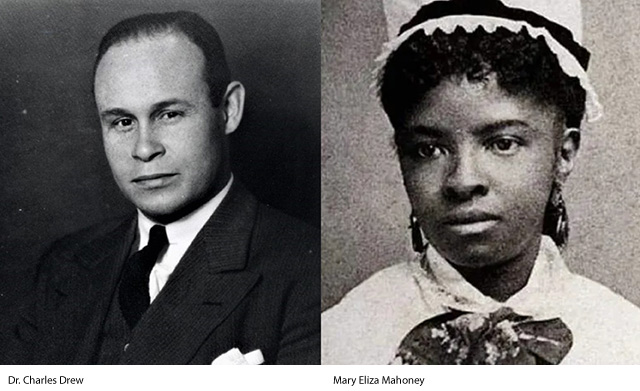
Our Employee Relief Fund remains in place to provide a helping hand to any Texas Children’s employee with proven financial hardship. The application process for the Relief Fund can be completed entirely online. Read more

Our Employee Relief Fund remains in place to provide a helping hand to any Texas Children’s employee with proven financial hardship. The application process for the Relief Fund can be completed entirely online. Read more

In celebration of Black History Month, Texas Children’s Medical Staff Committee on Diversity, Inclusion and Equity is shining a light on African American pioneers in medicine. This week we salute Dr. Charles R. Drew, the “Father of Blood Banking,” and Mary Eliza Mahoney, America’s first Black registered nurse.
In Texas, hemorrhage is the leading cause of maternal morbidity and death up to seven days postpartum. And though the statistics are unnerving – Black women are 3-4 times more likely to die a pregnancy-related death compared to white women, regardless of education level, income and medical comorbidities – Texas Children’s is focused on a solution.
Through implementation of the Obstetric Hemorrhage Patient Safety Bundle, the Pavilion for Women has reduced the rate of severe maternal morbidity from hemorrhage and eliminated the disparity in outcomes between Black and white women. The bundle includes the establishment of massive and emergency release protocols for transfusion of blood products, which can save lives by ensuring our patients receive the blood they need, when indicated, in a timely manner.
As Texas Children’s has extensive blood banking capabilities and is home to a diverse, multidisciplinary team of medical providers, this week we recognize Black health care pioneers Dr. Charles R. Drew and Mary Eliza Mahoney – without whom our success in reducing obstetric hemorrhage would not have been possible.
Charles Richard Drew, M.D.
Known as the “Father of Blood Banking,” Dr. Charles Richard Drew pioneered blood preservation techniques that led to thousands of life-saving blood donations. Drew’s doctoral research explored best practices for banking and transfusions, and its insights helped him establish the first large-scale blood banks.
Drew directed the Blood for Britain project, which shipped much-needed plasma to England during World War II. He then led the first American Red Cross Blood Bank and created mobile blood donation stations that are now known as bloodmobiles – but Drew’s work was not without struggle. He protested the American Red Cross’ policy of segregating blood by race and ultimately resigned from the organization.
Despite his renown for blood preservation, Drew’s true passion was surgery. He was appointed chairman of the Department of Surgery and chief of surgery at Freedmen’s Hospital (now known as Howard University Hospital) in Washington, D.C. During his time there, he went to great lengths to support young African Americans pursuing careers in the discipline.
Source: Julia Haskins, Association of American Medical Colleges
Mary Eliza Mahoney
Mary Eliza Mahoney holds the honor of becoming the first Black registered nurse. In 1879, she graduated from a program in New England that required 16 hours of labor, seven days a week. By the end of the program, she was one of three graduates out of a class that began with 40 students. She proved her mettle and went on to blaze trails for future nurses.
In 1908, Mahoney helped to establish the National Association of Colored Graduate Nurses and proved, on a daily basis, that Black nurses were in no way inferior to others. In recognition of her momentous achievements, the American Nurses Association created the Mary Mahoney Award, which is still considered one of the highest honors a nurse can receive.
Source: Angelina Walker, Nursing.org
Texas Children’s is committed to cultivating a more diverse, equitable and inclusive culture that supports every team member in feeling they are valued and belong. Additional information about this important, ongoing work will be shared throughout the year via email and on Connect.

Effective January 26, all Texas Children’s team members returning to the United States from another country must self-quarantine for a minimum of seven days. Read more